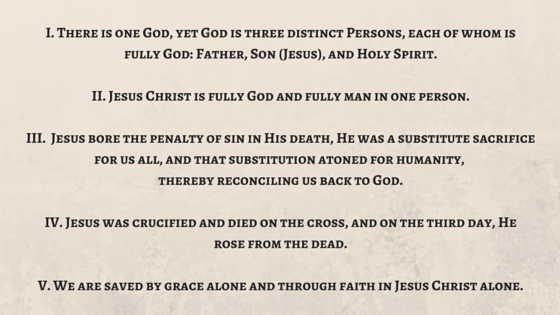What Christians Should Know (#WCSK): Volume Zero takes a step back and investigates basic ideas about God, the Bible, and the Christian faith. This series provides crucial answers to critical questions about belief.
Many readers have now stumbled upon the “Five Core Doctrines of the Christian Faith” that is detailed both within the first few pages of the e-book, What Christians Should Know Volume I, and WCSK’s home page. Several have questioned where these core doctrines come from, what makes them foundational, and why they are foundational. The answers to these questions are the purpose of this lesson.
The Five Core Doctrines of the Christian Faith:
So, why the five core doctrines?
The simplest answer is that they explicitly clarify what you believe. Imagine that someone walks up to you on the street and says, “What truth claims make Christianity unique?” Would you be able to give a clear, specific answer? When I was asked this question a few years ago, I didn’t have a clear, specific answer readily available. I was like most Christians who have a general sense of what they believe—for example, belief in Jesus, His moral prescriptions, and the Bible—but those general things do not validate why the Christian faith matters. You could, for example, think that the Bible tells a “great story” about a “good guy” named Jesus who had some helpful ideas about how to treat others, but none of these things make Him worthy to be praised. The One who is worthy to be praised reconciles our broken relationship with The Lord, is the organizing principle of the entire universe (Ephesians 1:10) and satisfies the longing for eternity we all have in our hearts (Ecclesiastes 3:11).
Please note that the five core doctrines are not explicitly spelled out in the Bible. God never descended from heaven and told a prophet, “Keep these five doctrines close to your chest.” The importance of these doctrines is derived simply because of the fact that if any one doctrine is eliminated, the foundation of the Christian faith crumbles.
In reference to the resurrection, “If there is no resurrection of the dead, then not even Christ has been raised. And if Christ has not been raised, our preaching is useless and so is your faith” (I Corinthians 15:13-14, NIV).
The five core doctrines of the Christian faith are the crucial truth claims of the Bible. “Crucial” does not imply that other doctrines are irrelevant or are lacking in significance. It simply implies that when it comes to understanding our salvation—how we are delivered from sin and its consequences and, therefore, how our relationship to God is repaired—the five core doctrines clarify what is absolutely necessary for redemption. After all, salvation is why Jesus came in the first place.
He did not come to be “nice.” He did not come to illustrate good story-telling. He did not come to inspire social reform. He came to save sinners (Matthew 9:13; Luke 5:32, 19:10; Mark 2:17; I Timothy 1:15; c.f. John 3:16). Hence, the point of the Bible is for God to reveal Himself to us. The reason why He reveals Himself is because there’s a big problem (sin), and God provides a timeless answer (Jesus).
God has a huge vested interest in seeking, saving, and gifting eternal life. We must, therefore, be sure in our understanding of how God operates to make redemption happen. If we don’t know, then we are lost. If we are unsure, then we will waver. If we are mistaken, then what’s left is not Christianity, and the path to redemption is blocked.
How the five core doctrines help believers
The five core doctrines equip believers to do three things: (i) to have a succinct comprehension of what is true and therefore (ii) be able to quickly discern what is false doctrine. They also (iii) enable believers to amicably cooperate and work with other Christians who have peripheral doctrinal differences.
In regards to the content of the doctrines, the Bible does explicitly teach all five. This was discussed at length in the lessons on Who God Is (#1) and Jesus Christ (#2-5). I invite everyone seeking specific guidance and Biblical evidence of these truth claims to explore both lessons. Armed with the strong foundation of Biblical truth, whenever you read or hear something even slightly incongruent, the discrepancy will be obvious.
I can remember an incident some time ago on a Saturday; I stopped by a local business to grab a cup of coffee before going into the office. A woman approached me, and I just had the sense that she was some sort of evangelist. Perhaps, I thought to myself, she is a fellow sister in Christ. My defenses went down. I was genuinely curious about what she had to say, so I listened. As she went into her “elevator pitch,” it became clear very quickly that the content of what she was saying was foreign, despite the fact that she was saying some things that were reflections of Biblical truth. I then interrupted her and asked one simple question: “Is Jesus God?” She said, “No.” It was now explicitly clear that she was not a fellow sister in Christ. My defenses went way up. She had violated core doctrines #1 and #2. I tactfully and politely ended the conversation, because any person or any ideology that denies Jesus as the Messiah professes a lie.[1]
The body of Christ, or the church, or the community of Christ’s followers, is supposed to be unified and without internal strife or divisions. This is why Paul can write to the Corinthian church and say, “I exhort you, brethren, by the name of our Lord Jesus Christ, that you all agree and that there be no divisions among you, but that you be made complete in the same mind and in the same judgment” (I Corinthians 1:10). Yet, we all know that this is not a reality and that the plethora of Christian denominations testifies to the fact that certain practices and beliefs can separate Christians. However, the same author also wrote about the actuality that indeed, Christians are not going to agree on everything, and that’s okay, because no matter which side of the fence you stand on in regards to some peripheral issues, this will not fundamentally change salvation.
In Romans 14:1-19, Paul writes the following:
“Accept the one whose faith is weak, without quarreling over disputable matters. One person’s faith allows them to eat anything, but another, whose faith is weak, eats only vegetables. The one who eats everything must not treat with contempt the one who does not, and the one who does not eat everything must not judge the one who does, for God has accepted them. Who are you to judge someone else’s servant? To their own master, servants stand or fall. And they will stand, for the Lord is able to make them stand.
One person considers one day more sacred than another; another considers every day alike. Each of them should be fully convinced in their own mind. Whoever regards one day as special does so to the Lord. Whoever eats meat does so to the Lord, for they give thanks to God; and whoever abstains does so to the Lord and gives thanks to God. For none of us lives for ourselves alone, and none of us dies for ourselves alone. If we live, we live for the Lord; and if we die, we die for the Lord. So, whether we live or die, we belong to the Lord. For this very reason, Christ died and returned to life so that he might be the Lord of both the dead and the living.
You, then, why do you judge your brother or sister? Or why do you treat them with contempt? For we will all stand before God’s judgment seat … Therefore let us stop passing judgment on one another. Instead, make up your mind not to put any stumbling block or obstacle in the way of a brother or sister … Let us therefore make every effort to do what leads to peace and to mutual edification.”
Paul anticipates that there will be matters that are disputable. Some will go one way, and others will go another, but ultimately, these things will not alter the core fabric of the Christian faith. The five core doctrines are indisputable, and changing any one of them will alter the fabric of the Christian faith. So, with this understanding in mind, Christians can, for example, disagree on the consumption of alcohol, infant baptism, qualifications for communion, dietary guidelines, liturgical formulas, the qualifications of leaders in the church, and the interpretation of “day” during the six days of creation, but none of these disputes will change the foundational doctrines that everyone stands on. Hence, believers can agree to disagree on some peripheral matters and cooperate instead of competing. There are, therefore, battles that people can civilly have in the basement of the church, but when we all come upstairs to the main sanctuary, at the core, we all rest our feet on the same principal beliefs.
More next week in Part II …
Dr. C. H. E. Sadaphal
[1] Matthew 10:33; Mark 8:38; II Timothy 1:8; II Timothy 2:12; Titus 1:16; II Peter 2:1; I John 2:22-23

